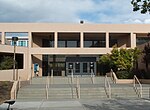Albuquerque Rapid Transit
2017 establishments in New Mexico2017 in transportBus rapid transit in New MexicoBus transportation in New MexicoProposed bus rapid transit in the United States ... and 3 more
Transportation in Albuquerque, New MexicoTransportation in Bernalillo County, New MexicoUse mdy dates from October 2022

Albuquerque Rapid Transit, also known as ART, is a bus rapid transit (BRT) system serving the Central Avenue corridor in Albuquerque, New Mexico, United States. There are two lines running between Tramway Boulevard (NM 556), the Central and Unser Transit Center (CUTC), and the Uptown Transit Center (UTC). It was built in 2016–17 and began limited operation in November 2017, but was subsequently delayed for over two years due to problems with the stations and buses. After the original fleet of electric buses was replaced with diesel buses, the line began regular service on November 30, 2019.
Excerpt from the Wikipedia article Albuquerque Rapid Transit (License: CC BY-SA 3.0, Authors, Images).Albuquerque Rapid Transit
Central Avenue Northeast, Albuquerque Nob Hill
Geographical coordinates (GPS) Address Nearby Places Show on map
Geographical coordinates (GPS)
| Latitude | Longitude |
|---|---|
| N 35.081027777778 ° | E -106.62 ° |
Address
Central Avenue Northeast
87106 Albuquerque, Nob Hill
New Mexico, United States
Open on Google Maps








